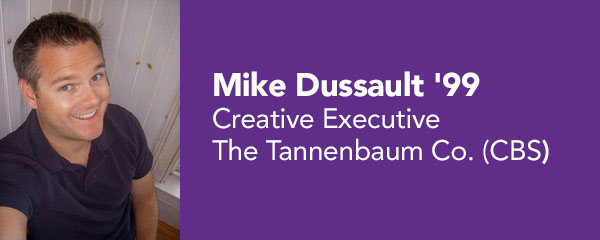Meet Brian Lockhart ’96, NFL Network Originals Programming & Development, National Football League (NFL)
In one sentence, what does your job entail?
I am responsible for developing long form content for NFL Media, from the idea phase for shows and series all the way through execution.
What planned and unplanned events connected you to your industry and your first employer after Holy Cross?
I found a summer job at a small production company in New York City between my junior and senior year to be close to my then girlfriend who was from New Jersey. Prior to graduating, and without a real plan for my future beyond a vague notion of grad school, I wrote a cold letter (no email!) to HC basketball alum Steve Anderson, (class of 1976) who was the Senior VP of Remote Production at ESPN. He responded and helped me get an interview at ESPN. (Important Note: Steve has remained a supporter and mentor throughout my career. His selflessness has inspired me to also mentor HC alums).
How did you learn/decide it was a good fit for you?
Initially, it was a horrible fit. I had quite possibly the worst production assistant job interview in the history of ESPN – after being asked the last three winners of the Vezina Trophy I asked the humorless hiring manager, “What’s the Vezina Trophy?”. But I persevered, eventually stopping the interview and making an impassioned plea highlighting my strengths as a college athlete who understood the nuanced narrative structure of SportsCenter highlights… And somehow I received and accepted a job offer during the haze of Cape Week. I started two weeks after graduation and have worked in sports television ever-since. Considering that I didn’t even know television was a career path, I would say this profession chose me. I did not choose it. Ignorance truly is bliss.
What were you involved in when you were on campus?
Varsity basketball 1992-’96 and co-captain (’95-’96). Black Student Union Member
What was your major and how did it affect your career decisions?
I was a mediocre at-best Mathematics major. Math had zero bearing on my career path, None. Zilch. Nada. It IS a fun fact to drop in the world of sports media to elicit strange reactions.
My mathematics degree did come in handy as an associate director at HBO Sports. I was charged with counting backwards to zero making sure we got on and off the air cleanly and didn’t hit video freezes on replays. Degree affirmed!
But Math wired me to be solution driven. I am a novice when it comes to corporate politics but I can filter out distractions and solve problems – they just happen to be creative sports-related problems. Knowing what I know now, I would have pursued a degree in religion and philosophy, striving to be a slightly darker but heftier version of Prof. Joe Lawrence.
What are one or two skills that you developed at Holy Cross that you use in your work?
Holy Cross instilled in me the love of learning. Instead of acquiring knowledge merely as a means to an end, I developed a thirst to grow and apply my Mt. St. James scholarship beyond the gates of HC. Props to FYP (First Year Program).
As a naive seventeen year old freshman, the somewhat nebulous liberal-arts inspired question posed to our class, “How then shall we live?”
My answer: “Paycheck to paycheck”
I never seriously wrestled with this question while on campus but I didn’t forget it either. “How then shall we live?” didn’t resonate until years later – now I can’t escape it. That singular question relentlessly provokes me to make an impact – hopefully a positive one. Ultimately, it has gifted me more questions, dynamic experiences, earned values and occasional wisdom.
What was the question again? I am also good with budgeting. Thank you American Express.
What advice do you have for students on campus today?
Know thyself.
Cease fighting everyone and everything.
Say yes – a lot.
Collaborate.
Be a great teammate.
Give until it hurts then give some more.
Creativity is work.
Make it better.
Own your sh*t.
Enjoy the grind.
Ignore the mantras of others – know thyself. (That last answer may only be useful to my therapist).
Just in case you end up interviewing for a PA position at ESPN http://www.nhl.com/ice/page.htm?id=24965


